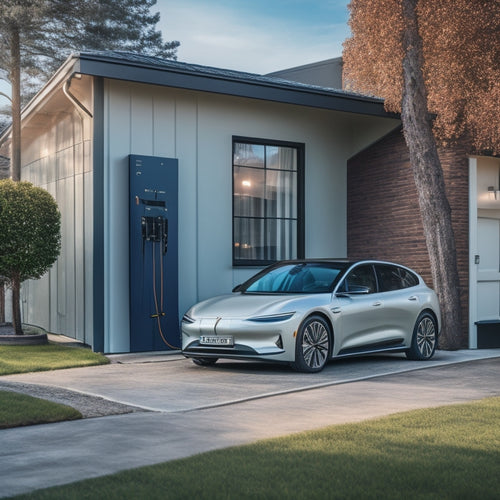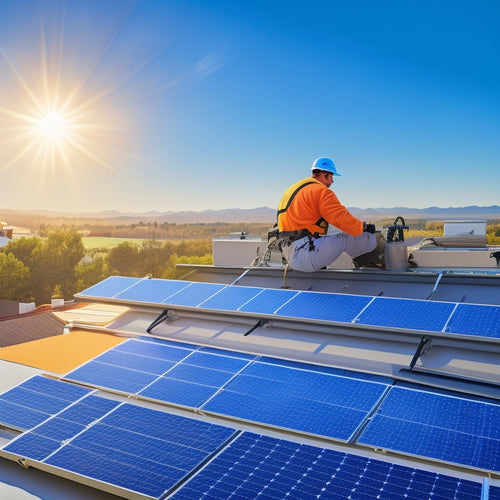
The Average Cost of Solar Panels for Your Home
Share
You can expect to pay between $12,500 and $35,000 for a typical residential solar system, with the average cost of solar panels ranging from $2.50 to $3.50 per watt, depending on factors like panel efficiency, installation location, and market fluctuations. These costs can be broken down into the upfront cost of the panels themselves, installation, and additional equipment, with financing options available to spread costs over time. As you consider investing in solar energy for your home, understanding the factors that affect pricing and the various incentives available can help you make an informed decision, and exploring these topics further can provide even more perspectives into the benefits of going solar.
Key Takeaways
- The average cost of solar panels ranges from $2.50 to $3.50 per watt, with typical residential systems costing between $12,500 and $35,000.
- Installation costs vary by location, with labor costs, permits, and inspections impacting overall pricing.
- The cost of solar panels has dropped by around 70% since 2010, making solar energy a more accessible option.
- Federal tax credits can cover up to 26% of installation costs, and state rebates and local programs provide additional financial discounts.
- The average residential solar system can save homeowners up to $500 annually on their electricity bills.
Understanding Solar Panel Costs
When it comes to understanding solar panel costs, you're likely looking at a complex array of factors that can drive up or down the final price tag.
You need to take into account the initial investment, which includes the cost of the panels, installation, and additional equipment. Solar panel financing options can help spread the cost over time, making it more manageable for homeowners.
As solar technology advancements continue to improve efficiency and reduce production costs, the overall expense of solar panels has decreased.
However, high-efficiency panels or premium brands may still come at a higher cost. You'll also need to factor in the cost of inverters, mounting systems, and monitoring equipment.
Furthermore, local and state incentives, as well as federal tax credits, can help offset the upfront cost.
Factors Affecting Solar Panel Pricing
As you weigh the pros and cons of investing in solar energy, it's clear that understanding the factors that influence solar panel pricing is vital to making an informed decision.
You need to take into account panel efficiency, which affects how much energy your system produces. Higher-efficiency panels typically cost more, but they can also generate more power per hour of sunlight.
Installation location is another key factor, as local labor costs, permits, and inspections can vary greatly. The type of panel you choose also impacts pricing, with monocrystalline panels generally being more expensive than polycrystalline ones.
Market demand, government regulations, and financing options also influence solar panel pricing. If demand is high in your area, prices might be higher. Government incentives, such as tax credits, can reduce the upfront cost, while financing options like loans or leases can spread the cost over time.
Technology advancements and maintenance costs are also important to take into account, as they can impact the system's overall performance and longevity.
Average Cost of Solar Panels
Determining the average cost of solar panels is an essential step in evaluating the feasibility of switching to renewable energy. As you consider investing in solar power, understanding the average cost of solar panels will help you make an informed decision.
The average cost of solar panels varies depending on the type of solar panel you choose. Typically, monocrystalline solar panels are the most expensive, while polycrystalline and thin-film solar panels are more affordable.
You can expect to pay between $2.50 and $3.50 per watt, with a typical residential solar panel system ranging from 5 to 10 kilowatts. This translates to an average cost of $12,500 to $35,000 for a complete system.
Fortunately, there are various financing options available to help make solar power more accessible. You may be eligible for federal and state tax credits, as well as rebates and incentives from utility companies.
Additionally, many solar panel manufacturers offer financing plans and power purchase agreements to help spread the cost over time.
Cost Breakdown for Solar Systems
You'll want to understand the cost breakdown for your solar system to get a clearer view of where your money is going. The total cost of a solar system includes several components, each with its own price tag.
The largest expense is typically the upfront cost of the solar panels themselves, which can range from $15,000 to $30,000 or more, depending on the size and quality of the system.
Solar panel financing options, such as loans or power purchase agreements, can help spread the upfront cost over time. You may also be eligible for tax credits or rebates, which can reduce the overall cost.
Additionally, you'll need to factor in maintenance costs, which are typically low but can add up over the system's 25-year lifespan. Other expenses may include permits, inspections, and connection fees.
Solar Panel Installation Costs
The labor cost of installing solar panels accounts for a significant portion of the overall expense, ranging from $2.50 to $3.50 per watt. This cost varies depending on the complexity of your roof, the number of solar panels needed, and the installation company you choose.
For a typical residential solar system, you can expect to pay between $10,000 and $15,000 for installation alone.
When considering installation financing, you'll want to factor in the type of solar panels you're using. Different solar panel types, such as monocrystalline or polycrystalline, have varying installation costs. For example, monocrystalline panels tend to be more expensive due to their higher efficiency rates.
To get the best deal, research local installation companies and compare their prices. Be sure to ask about any additional costs, such as permits, inspections, and connection fees.
Incentives and Rebate Programs
Fortunately, the cost of solar panels can be offset by various incentives and rebate programs offered by governments, utilities, and manufacturers.
You can take advantage of federal incentives, such as tax credits, which can cover up to 26% of your total solar panel installation cost. Additionally, state rebates and local programs can provide additional discounts.
Many utilities offer financing options, such as solar loans, to help you cover upfront costs. You may also be eligible for community solar programs, which allow you to benefit from shared solar panel systems.
Environmental grants and installation discounts from manufacturers can also help reduce your expenses.
In addition, investing in solar panels can increase your home's energy efficiency, leading to long-term savings on your energy bills.
Is Solar Energy Worth It
You're likely wondering if the investment in solar panels will pay off in the long run.
As you consider the average cost of solar panels, remember that energy savings add up over time, and the environmental impact of renewable energy is a significant benefit.
Additionally, solar energy can increase your property's value, making it a worthwhile long-term investment.
Energy Savings Add Up
By switching to solar energy, homeowners can start reaping significant energy savings right away.
You'll be reducing your reliance on the grid, which means lower electricity bills and more money in your pocket.
Here are three ways solar energy can enhance your energy efficiency and financial benefits:
-
Reduced Energy Consumption: Solar panels generate electricity on-site, reducing your energy consumption from the grid. This leads to lower electricity bills and a decrease in your carbon footprint.
-
Net Metering: Many utility companies offer net metering programs, which allow you to sell excess energy back to the grid and offset your energy costs.
-
Increased Property Value: Installing solar panels can increase your property value, making your home more attractive to potential buyers if you decide to sell in the future.
Environmental Impact Matters
As one becomes increasingly aware of the devastating effects of climate change, the importance of reducing carbon emissions takes center stage.
You're likely considering solar panels as a viable option to minimize your carbon footprint. And you're not alone – millions of homeowners worldwide are switching to solar energy to reduce their reliance on fossil fuels.
Solar energy offers significant sustainability benefits, including a drastic reduction in greenhouse gas emissions.
By utilizing the power of the sun, you'll no longer be contributing to the pollution caused by traditional energy sources.
In fact, a typical residential solar panel system can reduce carbon emissions by up to 80,000 pounds over its lifespan – equivalent to planting over 1,000 trees.
Long-Term Investment Value
The long-term investment value of solar energy is an essential consideration for homeowners contemplating a switch to renewable energy.
You're not just paying for a system that generates electricity; you're investing in a technology that can save you money and increase your property's value over time.
When evaluating the long-term investment value of solar energy, consider the following benefits:
-
Return on Investment (ROI): Solar panels can provide a significant ROI, with some homeowners seeing savings of up to $500 per year on their electricity bills.
-
Increased Property Value: Installing solar panels can increase your property's value, making it more attractive to potential buyers if you decide to sell in the future.
-
Financing Options: With various financing options available, including loans and power purchase agreements, you can install solar panels with little to no upfront cost.
Frequently Asked Questions
Can I Install Solar Panels on a Rented Property?
You'll need to maneuver solar panel regulations and rented property considerations before installing solar panels on a rental property, as landlord permission and local policies may impact your ability to do so.
Do Solar Panels Void My Roof's Warranty?
As you traverse the solar terrain, beware of the warranty wolf lurking in the shadows; installing solar panels might awaken it, but following strict installation guidelines can keep your roof's warranty intact, ensuring a harmonious coexistence.
Can I Sell Excess Energy Back to the Grid?
You can sell excess energy back to the grid through net metering, earning energy credits that offset your consumption when you need it, allowing you to maximize your solar investment and minimize your reliance on traditional power sources.
Do Solar Panels Work During Power Outages?
You're not entirely powerless during blackouts, thankfully! Your solar panels can't generate electricity during an outage, but with a battery storage system, you'll have a backup plan, ensuring some solar panel efficiency and a sliver of independence from the grid.
Can I Finance My Solar Panel System?
You can finance your solar panel system through various options, including solar panel loans, home equity loans, and power purchase agreements, offering flexible financing options to suit your budget and energy needs.
Related Posts
-

5 Essential Tips for Buying EV Charging Systems Online
When purchasing an EV charging system online, you'll want to make sure you're making an informed decision. First, det...
-

Charging Station Incentives: Why So Many Are Free
You're likely to stumble upon free or low-cost charging stations due to a convergence of incentives. Government rebat...
-

3 Essential Steps for Solar Electricity Installation
To guarantee a successful solar electricity installation, you'll need to follow three essential steps. First, assess ...


